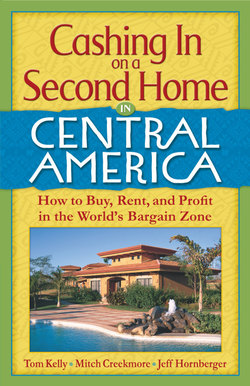Читать книгу Cashing In On a Second Home in Central America: How to Buy, Rent and Profit in the World's Bargain Zone - Tom Hammond Kelly - Страница 26
На сайте Литреса книга снята с продажи.
Government incentives for second-home purchasers
ОглавлениеIt’s no longer the best-kept secret in second-home possibilities. Publications such as Modern Maturity, International Living, The Wall Street Journal and The New York Times have published stories explaining why Panama has finally hit the radar screen as a retirement and second-home location. However, the benefits and rationale go beyond the gorgeous landscapes and bargain-basement prices. The Panamanian government is very keen on increasing second-home ownership and has outlined several programs through which investment in the country is rewarded with economic incentives. The most significant incentives are exemption of property taxes on new construction properties for up to 20 years plus one of the most generous pensioner/retiree programs in the world.
While the plan is aimed at retirees, anyone over the age of 18 may apply and can qualify as a pensionado in Panama. All that is required is a guaranteed pension income of $500 per month ($600 for a couple). It must be a pension from a government agency (e.g., Social Security, disability, Armed Forces, etc.) or a defined-benefit pension from a private company. An immediate, fixed annuity doesn’t qualify.
As a qualified pensionado/retiree, you are entitled to a one-time exemption from duties on the importation of household goods (up to $10,000) and an exemption every two years from duties on the importation or local purchase of a car (only sales tax and luxury tax would still apply).
In a capsule, Panama has two visas—the pensionado and rentista—that specifically target retirees. In addition, some retirees may qualify for economic self-sufficiency visas. Panama’s pensionado visa was modeled on that of Costa Rica, which implemented policies favorable to international retirees and drew large flows of foreign pensioners in the 1980s. (However, Costa Rica significantly scaled back the incentives associated with its pensionado visa). Applicants for a pensionado visa in Panama do not need to be of traditional “retirement age,” but they must be retired (no longer employed, at least in Panama) and receive government or private pensions of $500 per month, or $600 per month for a couple. The pensionado visa allows retirees to remain in the country indefinitely, although they are not eligible for citizenship with this visa type.
| What Are Panama’s Real Estate Taxes? |
| •There is an annual Land Tax and an Improvements Tax |
| •Land Tax is exempt for the first $30,000 of value. Amounts greater than $30,000 are taxed at approximately 2 percent of value. For example, on a lot worth $100,000 you will pay a yearly tax of $1,400 ($100,000 – $30,000 = $70,000 X 2 percent) |
| •Improvements Tax is exempt for 20 years. After 20 years, the tax is approximately 2 percent of value. As of September 2007, the tax break will vary depending on the value of property as shown below: Under $100,000 – 15 years; $100,000 to $250,000 – 10 years; greater than $250,000 – 5 years |
| •Tax benefit on improvements transfers from one owner to the next. For example, if you buy in 2008 a property that was built in 2000, you will still have a tax benefit of 12 years. |
Retirees who do not receive regular pensions may instead apply for Panama’s rentista visa. Rentista applicants must place an amount of money—now hovering around $225,000—in a five-year certificate of deposit at the National Bank of Panama in order to yield at least $750 in interest per month. The rentista visa, unlike the pensionado, allows its holders to obtain a special Panamanian traveling passport, though like the pensionado it does not confer Panamanian nationality. The rentista visa must be renewed every five years.
| As a qualified pensioner in Panama, you would be entitled to: |
| Travel and entertainment benefits |
| •50 percent off the price of admission to movies, theaters, sporting events and other public events |
| •30 percent off fares for buses, trains, small boats and ships |
| •25 percent off the fares of national airlines |
| •50 percent off hotels and motels from Monday through Thursday, and 30 percent off from Friday through Sunday |
| •25 percent off restaurant food and 15 percent off fast food chain restaurants |
| Health care benefits |
| •15 percent off hospital and private clinic services, if you have no hospital insurance |
| •10 percent off prescription medications |
| •20 percent off medical consultations |
| •15 percent off dental and optometry services |
| Professional fee discounts |
| •20 percent off technical and professional service fees |
| •50 percent off closing costs and commissions for loans |
| •15 percent discount on loans |
| •1 percent point reduction of mortgage interest rates |
| Utility expense discounts |
| •25 percent discount on power bills of less than $50 |
| •25 percent off fixed cost of telephone service |
| •25 percent off water charges below $10 |
